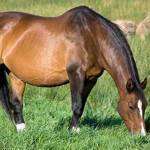Overfeeding Broodmares: Two Reasons to Just Say No

Plane of nutrition and body condition are important considerations before breeding. Mares that are either too fat or too thin have decreased conception, pregnancy, and foaling rates, but there is more to it than just percentages.
“We have long touted that the ideal body condition score, or BCS, of mares at time of breeding is 5 or 6 on the Henneke nine-point body condition scale, where 1 is emaciated, 9 is obese, and 5 represents moderate body condition,” explained Kathleen Crandell, Ph.D., an equine nutritionist for Kentucky Equine Research.
BCS recommendations for mares often go unheeded, unfortunately. As a result, overweight mares are bred and continue to gain unnecessary weight during pregnancy. Problems associated with this management slipup are important to breeders because, according to a recently published review article* focused on overweight mares, “many environmental factors, including nutrition, can alter the phenotype (the way a foal looks) of offspring when applied during critical periods of development…and can lead to abnormalities in the adult.”
The nutritional status of the mare during pregnancy influences the development of the fetus. Although fetal growth is impacted by a number of important factors, two are especially relevant to overweight mares:
- Reduced sensitivity to insulin. Studies in other mammals, such as humans and sheep, show that offspring born to overfed dams have a decreased response to insulin. This means that the pancreas needs to produce more insulin to maintain normal blood sugar levels. Later in life, insulin sensitivity could worsen. In horses, insulin resistance is an important risk factor for equine metabolic syndrome and laminitis.
“In addition, alterations in fetal insulin sensitivity could impact the health and athletic performance of foals born to obese mares, which are both associated with negative economic and welfare-related issues,” noted Crandell.
- Decreased colostrum quality. Mares fed only 20% more energy than recommended by the National Research Council in the 110 days before their expected foaling date had lower IgG concentrations in their colostrum. Although no evidence of failure of passive transfer was observed, maternal overnutritition could potentially impact a neonatal foal’s ability to fight infection.
The researchers concluded, “This influence of maternal nutrition on glucose and insulin dynamics warrants further investigation because it may be related to athletic performance and metabolic disease in the adult. Further studies will be necessary to fully elucidate the influence of mare nutrition during pregnancy on development of the fetus as well as long-term consequences of developmental programming.”
*Coverdale, J.A., C.J. Hammer, K.W. Walter, et al. 2015. Horse species symposium: nutritional programming and the impact on mare and foal performance. Journal of Animal Science. 93:3261-3267.
Nano•E® is a powerful water-soluble liquid vitamin E antioxidant supplement for horses in a unique, rapidly bioavailable form. Vitamin E is an essential component of body-wide antioxidant defenses and plays a vital role in immune, cardiovascular, circulatory, neuromuscular, and reproductive functions. Learn more.








